- Home
- Laura Purcell
The Poison Thread Page 5
The Poison Thread Read online
Page 5
I liked to know it was there, waiting for me. I liked to close the drawer and hear the bullets roll.
5
Dorothea
Today my carriage passed through the gates just as a Black Maria trundled to a halt in front of the prison. I reached to put down the window and tell Graymarsh to slow his pace, but he anticipated me. Our horses broke their trot and settled into a walk.
Police transportation is seldom pretty. Beneath the ecstatic blue of the morning sky, the Black Maria and its dark pair of horses looked positively funereal. I noted gouges on the body of the coach and great scratches that might have been made with fingernails. I attempted to imagine a violence as rabid as that: a force that cannot be contained.
Staff had gathered on the steps of the prison. Not merely the matrons but burly men with very little neck. This one was a fighter.
Policemen unbolted the doors. David would not be out on such an errand, yet still I searched for his whiskers amongst the blue-coated men as they pulled a faceless, shapeless mass from the vehicle. It stumbled, unsteady on its legs. Only the ripped skirt dragging on the gravel suggested it was female.
Little by little, she unfolded. A wild tangle of hair, grey with dirt, and a sharp face. I did not like the eyes.
I knew she would lunge and she did, just as the prison bell tolled. It was futile. Masses of policemen and hordes of staff were prepared to restrain her flailing limbs. She could not seriously have expected to escape. Perhaps she just wanted to claw and inflict injury while she still could? Her shrieks and curses joined with the bell in a terrible evensong.
‘I think I shall leave off visiting that prisoner,’ I told Tilda. ‘At least for the present.’
By contrast, Ruth Butterham’s cell seemed a haven of peace when Matron shuffled me inside. Jaundiced light fell through the circular window of yellow glass and wire, touching the top of Ruth’s unkempt head. I narrowed my eyes, hoping to discern the lineaments of the skull, but her hair was impenetrable.
The prisoner tilted her chin up as I entered, and I saw with relief that she was not picking that awful oakum. A Bible lay spread on her lap. Her hands, though stained, were motionless.
‘Good morning, Ruth. How pleased I am to see you so employed.’
‘Oh, it’s you, miss.’ She did not speak with much enthusiasm.
‘Yes. I told you I would come.’
Matron clanged the door shut. I felt it with my body. She did not say anything this time about keeping a watch on us. I pushed down my sense of foreboding and took a seat.
Ruth’s dark eyes studied me. Up and down, pausing at my cuffs, my hem and my waist. Her mother had been a seamstress, of course – she would be noting every detail of my dress.
‘Tell me what you have read today, Ruth.’
Ruth sighed and closed the Bible softly. ‘People are always asking me that. They think, because I did bad things, that I never read the Bible or went to church. But I always did.’
‘Well, perhaps you have never really understood the Gospel? It may not have been explained to you properly.’
Her brow furrowed. It made her eyes look even farther apart. ‘Maybe it hasn’t. But I know enough. I think people know when a thing is wrong, but they do it anyway. They do it because they want to.’
I shifted on my chair. ‘But if that were true, Ruth, if we all acted on our baser instincts, we should all be in prison.’
‘Why, miss!’ A smile crept up her cheek. ‘You don’t mean to say that you have bad thoughts, too?’
Sauce and impudence! A blush hit my face like scalding water. I checked over my shoulder to see if Matron was hovering at the hatch. It was shut. ‘No one is perfect, Ruth. For myself, I belong to the Roman Catholic Church. If I am ashamed of any thought, I confess it to the priest and ask him to absolve me.’
‘I gave my confession to the bluebottles, but I don’t think they’ll let me off, do you?’
‘But that is not the same. Surely you see? You only signed a paper saying you had killed your mistress. You did not explain what was in your heart at the time.’ She turned her head away; a typical, childish gesture. ‘And then when you spoke to me the other day, you mentioned others. People you had killed by accident. What about them? Were you in earnest, or was that an invention?’
She did not answer. Closing the Bible, she held it in one hand, drumming her fingertips upon the cover. Raw. Black-tipped. What had those fingers done?
‘You could tell me.’ My voice came out strained. ‘You have started to talk about your life at home with your family. Why not confide in me further? You might find it a purgative, Ruth.’
‘Ah! So you’re a gossip, are you? That makes sense.’
‘I am not a gossip!’ I flared. Too loud. Matron’s steps echoed in the corridor, coming our way.
Ruth closed her eyes. Her lips compressed. ‘You want a story. Something you can tell your friends over tea. Well, I’ve had enough of people talking behind my back.’
‘People will talk, whatever happens. There will be newspaper accounts . . . Maybe even ballads. Only you can reveal the truth.’
She smiled. Not a pleasant smile. It chilled me. ‘Happen I will tell you, miss. But don’t pretend it’s for me. It’s about you.’
Before I could respond, the door screeched open. Matron banged in, her keys tinkling like rain. ‘Everything all right, Miss Truelove?’
I stood. To my mortification, one of my legs trembled beneath my skirts. I did not like to appear discomposed before Matron.
‘Yes, thank you, Matron. Everything is in order. I was just moving on to visit Jenny Hill.’ I looked at Ruth. Usually I would extend a hand for her to shake, but I blanched at the idea of those fingers upon my gloves. Instead, I nodded. ‘I will come again next week, Ruth. We can talk at greater length.’
She stuck out her chin. ‘You won’t like it, miss.’
I fear that perhaps she is right.
6
Ruth
Pins and needles ran up my legs. I scooted round on my knees, trying to draw the chalk line straight on the bolt of calico.
‘You need to start the pattern closer to the edge,’ Ma called from the window. ‘Otherwise you’ll waste material.’
I nodded, but I didn’t obey her.
‘We have been using rather a lot of material, recently.’
‘I’m sorry, Ma. This is new to me.’
Ma rubbed the bridge of her nose, then returned to the stocking she was seaming. ‘I understand that, dear. I would bend to do it myself, if I could, but . . .’
‘I know. The baby’s too big.’
Always the baby. At least this time, it was doing me a favour.
You might think it was a shabby trick, making waste on purpose. But if Mrs Metyard and her customers could dress in silk and lace, I reckoned I was entitled to a scrap of calico from her stores. Calico was the perfect lining.
I finished my marks and dusted off my hands. ‘There.’
‘Good. Could you cut it out?’
Reaching for the fabric scissors, my hand brushed something smooth. I turned my head.
It was a scrap of peach sateen, entwined seductively around the scissors. My fingertips began to tingle.
Such a soft, sweet colour. Warming. A rose opening on a spring day. I wanted to touch it, wanted to be it. Cautiously, I picked up the scissors and the sateen together, holding them close to my apron.
‘The light is poor today,’ Ma sighed. ‘Your father will be having a hard time of it in the studio. It is so important for him to render the shadows correctly.’
Carefully, carefully, I slipped the material into my apron. I felt a bit brighter, a little more beautiful, just having it about my person.
‘Can you see to cut, Ruth?’
Only my scissors answered with their sharp snip.
‘A bit wider t
han that, darling, for the seams.’
‘Yes, Ma.’
Seams be damned. What I had in mind was more important.
Cutting out panels was long and laborious work, especially in the gloom. The scissors grew heavy; their metal handles bit into the skin around my fingers. I fought to see the chalk lines through tired eyes. My pupils felt drier than parchment, sprinkled with sand.
‘I thought I had some rushlights down here, but the box is empty.’ Ma frowned, looking across the room. ‘And do you know what became of our matches? I couldn’t find them in the kitchen.’
‘No. Should I run out and get some more?’ I offered.
‘Well, perhaps you should. You are struggling to cut that.’
Ma laid down her stocking and rummaged for a coin. Pocket after pocket turned out empty. Of a sudden, she stopped and clutched her stomach.
‘Ma? What is it?’
She didn’t heed me. She was listening to something, deep inside.
‘Ma?’
She shook herself. ‘All is well. It’s the baby, wriggling. Go upstairs and put on your bonnet, dear. I will find some money by the time you come down.’
It was just what I wanted to hear.
Pa was in his studio. I listened cautiously as I mounted the last few steps, afraid he might come out. There was a clink and a sigh from within. Then silence. I darted into my room, shut and locked the door behind me.
The loose floorboard was beneath my bed, hidden by the chamber pot. Dust made me sneeze as I scrabbled about and hooked my finger under the slat. There, glinting in the hole, was my hoard.
Ma’s matchbox and a handful of rushlights lay in a nest of pilfered material. Fabric layered upon fabric: soft and smooth; silky and rough; a kaleidoscope of colour. My greedy hands caressed it all. It was a hotchpotch, a harlequin’s wardrobe, but it was mine.
The mission was simple: remake the corset. Remake myself.
Every night I worked in secret and every night the garment became a little more real. This corset was taking a different shape to the last one. There were fewer gussets, shorter straps. It wrapped serpentine around my torso. Tight.
My busk was ruined. Nothing in my stash would serve for bones, but I found I didn’t need them. I could fortify the corset with cording: hessian, twill and buckram. Its strength would be mine. My labour, my stitches, my blood.
I laid the sateen in place and let down the floorboard. As I climbed to my feet, I remembered Rosalind Oldacre’s face that night. Once again I heard the snap of cane bones and the crack of my own shattered pride. How long will it take for them to break?
Not this time.
I vowed, there and then, to create something as strong as my rage. I would make more than a corset, more than a garment. I’d sew something that no power on earth could break.
7
Dorothea
We are entertaining guests for my twenty-fifth birthday! I expect I should be grateful to Papa for throwing such a lavish affair, with musicians hired especially for the occasion, but in all honesty, when a lady reaches a certain age, she prefers not to draw attention to the fact. I do not wish to mix with half of the wealthy families he deems it proper to invite, and I cannot flatter myself they would care a straw for my company, were I not set to inherit a fortune upon my father’s death. Besides all this, it falls to my lot to write the invitations and organise the necessary provisions of food and alcohol. On the whole, it is a troublesome undertaking.
This morning, I was sitting at my cherrywood desk writing directions for Tilda to take to the confectioner – although our cook is proficient in his way, he could never create the ornate meringues and towering jellies called for – when there was a tap at the door.
Wilkie chirruped as I answered, ‘Enter.’
Papa walked in, still wearing his smoking jacket. ‘Forgive me, my dear. Do I interrupt you?’
‘You do, sir, but it is a pleasant interruption. I have had as much blancmange and spun sugar as I can take.’
He smiled at the detritus on my desk. ‘Why, Dorothea, I am charmed to find you employed in this way! You say it is tiresome, but I would so rather your head be full of desserts than . . .’ A stiff nod in the direction of my shelves, groaning with books and porcelain phrenology busts. He does not know about the real skull, hidden inside my desk. ‘It is much more agreeable. More becoming.’
My shoulders tensed. After nearly twenty-five years, I am well aware that Papa’s views on female propriety are not my own. He has an acute sense of embarrassment, a fastidious need to obey social strictures as if they were Gospel. You would imagine the world were one enormous pair of eyes scrutinising his every movement. No amount of cajoling, explanation or reasonable argument on my part will change his mind. I must simply divert him down a different path.
‘Oh Papa,’ I rolled my eyes drolly. ‘Do not be such an old bear! Grump, grump, grump.’
Thankfully, he threw back his head and laughed. He was in a good mood. ‘Will you be able to civilise me in time for the party, do you think?’
‘I had hoped to. But look at this!’ I flicked my fingers at his sleeve. ‘A smoky old jacket in the company of ladies! I should have thought you would know better.’
‘I beg your pardon, Dora.’
‘Dotty,’ I corrected.
The name snuffed the light from his eyes. ‘You know I cannot call you that. I called your mother Dotty.’
I began to shuffle the papers on my desk. A stitch of memory opened: Mama, propped up in a bed of cushions, wheezing at me, her face the colour of tallow. Even then, she was still beautiful. I never experienced the dread children often conceive for sick relations. There was not a single moment when I feared her. But Papa did. I can feel it in the shift of air, whenever I mention her name. I can hear it in his silence.
Papa cleared his throat. ‘I forgot to ask if you have ordered Cabinet Pudding.’
‘Have you acquired a sudden taste for it, sir?’
‘You know that I have not. It is Mrs Pearce’s favourite.’
Of course I knew she was attending – I wrote the invitation with my own hand. All the same, it made me cross to have her spectre raised in my room: her pencilled eyebrows and lantern jaw jutting straight at me. Enthralling, they call her. I see no beauty – only arrogance.
‘And heaven forfend that Mrs Pearce should be disappointed,’ I breathed, addressing my menus. ‘Particularly on my birthday.’
‘That is not worthy of you, Dora. I know you do not like the idea of me marrying again, but your mother has been gone—’
‘She will not make you a good wife,’ I warned. ‘For all her acclaim in society. There is a decided dent right where Conjugality should sit, and I never saw smaller domestic propensities.’
He went on as if I had not spoken. ‘—a good many years now. You do not consider that you will soon be married, yourself, and I shall be left quite alone.’
Alone. I let the word ring for a moment. Ruth Butterham in her cell; Mama on her sickbed – that was the true meaning of alone. What Papa meant was he would have no one to play the piano while he read his newspaper.
Wilkie scuttled across his sandpaper, claws scratching.
‘I will soon be married? Pray tell me to whom, for this is the first I have heard of it. Has a gentleman applied to you, Papa?’
‘No, of course not.’ Irritation in his voice. ‘But you must choose a suitor. Leave it any longer and you will be a confirmed old maid. I could not bear the shame of that.’ A pause. ‘As a matter of fact, there is someone I would like you to meet.’
Panic leapt. Another one. With every year that passes, it is harder to turn them aside. Members of Parliament; estate owners; even an earl, once. Not one of them can stand beside my David: the scourge of pickpockets, the upholder of justice. Someone truly good and useful. I have never felt a flicker of attraction for anyon
e save him. But if Papa ever suspects my attachment . . .
‘Oh? Do go on.’
‘Sir Thomas Biggleswade is the name,’ he said. ‘A fine model of a man, excellent hunter. He has local connections and owns a place down in Gloucestershire.’
My smile felt like it had been carved into my face with a knife, but I held on to it. ‘Gloucestershire. Heavens, what a distance! How far I should be from my charitable work.’
‘Pish! Aren’t there prisons that need reforming in Gloucestershire?’
‘Well, I expect there are.’
A thought seemed to strike him, and his expression hardened. ‘But look here, Dora, you’re not to mention any of your prison folly at the party. Especially to Sir Thomas.’
‘He does not approve of charity, sir?’
‘I am in earnest. I will not have you spouting on about criminals, or science, or any other topics a young lady should be ignorant upon. I have had to face down enough foolish tittle-tattle in my time. I won’t have it said that I cannot keep my own daughter in check.’
I bit my lip. When did he suppose he ever had me in check? ‘Dear Papa, no one would say such a thing. Surely there is nothing remarkable in a gentleman giving his only child an education?’
‘There was nothing remarkable in the education I gave you. It is these books you buy and these – these heads.’ Colour rose in his cheeks. ‘I remember last Christmas. I assure you, everyone recalls the incident. We have yet to live it down. Mrs Pearce was not impressed. We must consider ourselves fortunate that she is kind enough to overlook your behaviour and continues to show you such attentions.’
As if it were my fault that the young men, after imbibing alcohol, asked me to read their scalps! I was being amenable. Certainly, it was no pleasure for me to run my hands through their bear-greased locks.
‘I am sorry, Papa. It was only meant in jest.’
He regarded me intently. Muscles twitched beneath the stubble on his jaw, fighting one another. I pouted and gave my most contrite expression, but it seemed as though he saw two ladies before him: one he loved dearly; the other he feared.

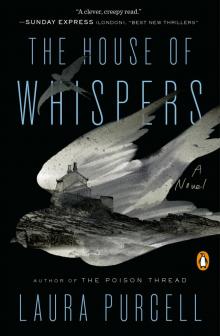 The House of Whispers
The House of Whispers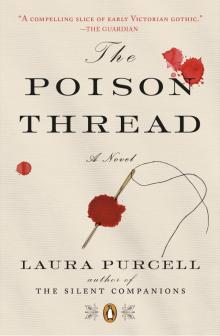 The Poison Thread
The Poison Thread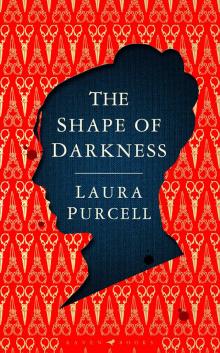 The Shape of Darkness
The Shape of Darkness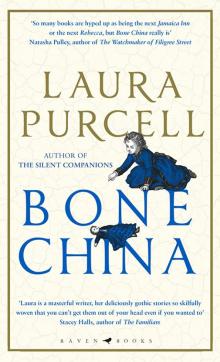 Bone China
Bone China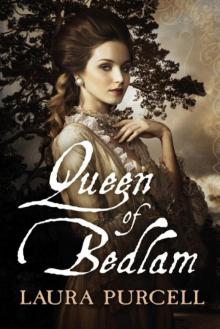 Queen of Bedlam
Queen of Bedlam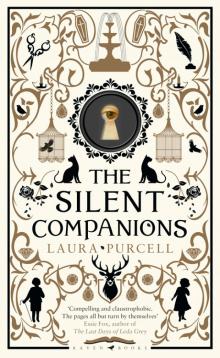 The Silent Companions
The Silent Companions